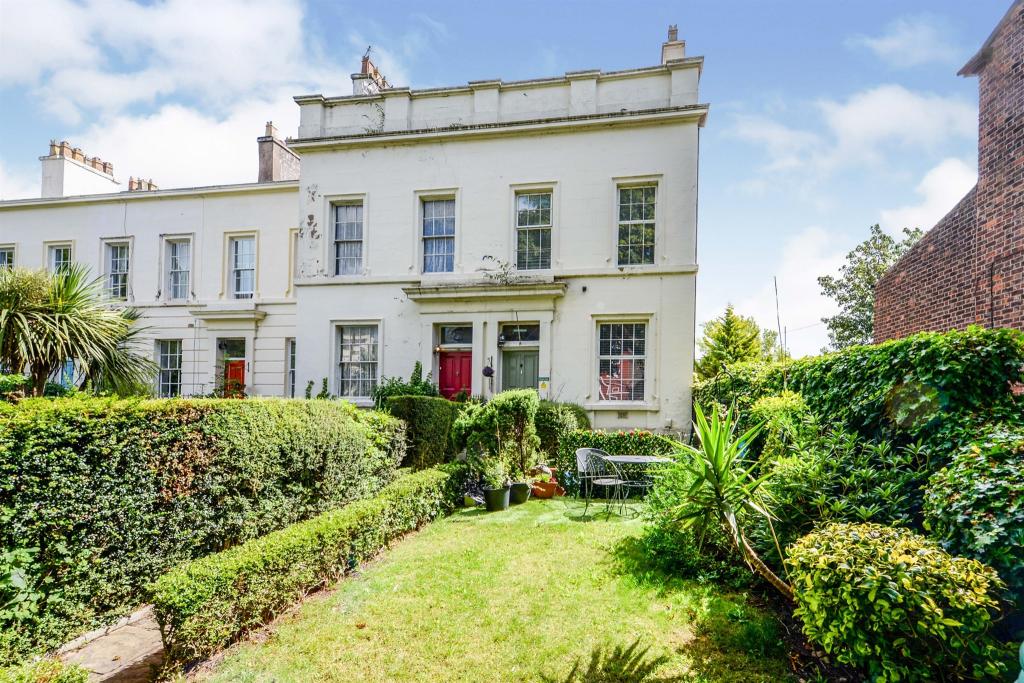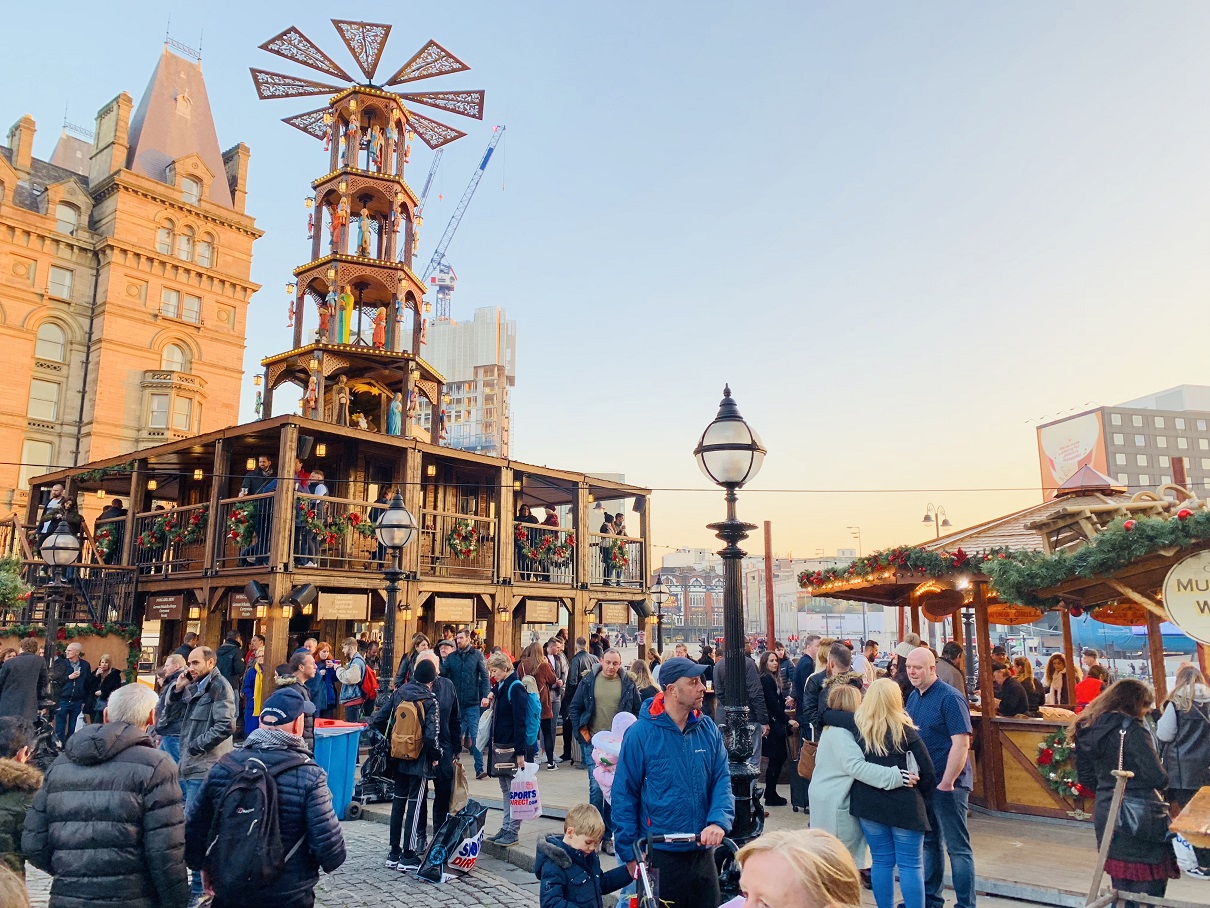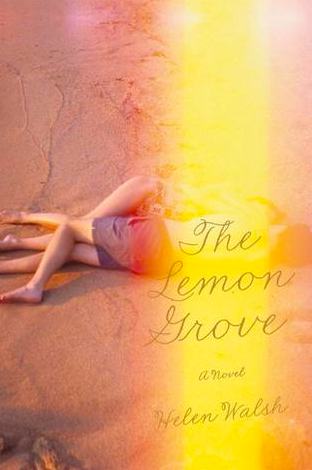'It can become a bit of a fear frenzy': Liverpool students tell us about drink spiking

Plus: The Guardian picks up our schools story, and the rest of the weekly briefing
Dear readers — welcome to this week’s briefing from The Post. Today we hear from female students in Liverpool about their fears of having their drinks spiked. We also have a lovely Georgian house in Wavertree as our “Home of the Week”, a local Covid-19 update, some fantastic recommended reads and details of Liverpool's Christmas Market.
It’s a big day for us because we’ve been mentioned in the national press for the first time. This morning’s Guardian has picked up our story about anti-vaccine groups targeting schools across Merseyside and organising via the social media app Telegram. Under the headline “Liverpool headteachers describe ‘sinister’ tactics of anti-vaxx protesters” the newspaper writes:
An investigation by the Liverpool Post found that parents appeared to be contacting a group administrator called George to arrange for a visit and for papers to be served on their school. Having visited the school, they then boast about frightening teachers and at one point say about a headteacher: “She can’t run, she can’t hide.”
The story is also on page 14 of the print edition. It’s great to see our reporting having this kind of impact so early on. We are right at the beginning of our journey in creating a new high-quality news organisation for Merseyside, and we’re very grateful for your support so far in spreading the word. There are now more than 3,000 readers on the mailing list and dozens more have joined this morning thanks to that Guardian story. If you think someone you know might like what we are doing, please do share this newsletter with them and tell them about The Post. And if you want to help us make this fledgling project financially sustainable so we can keep doing it and build a team of high-quality local journalists, please think about becoming a paying Post member when we open up our memberships next month.
Good to see @guardian following on the @liverpoolpost scoop from last week
— Robin Brown (@RobinBrown78) 10:30 AM ∙ Oct 26, 2021
Get in touch: If you want to tell us about a story or pass on some information, please email editor@livpost.co.uk or mollie@livpost.co.uk. We are always happy to speak to people off-the-record in the first instance, and we will treat your information in confidence and with sensitivity.
This week’s weather

Covid-19 update
The case rate for the Liverpool City Region is now falling. It’s at 406.4, down 1.6% on last week, compared to England’s rate of 483.5, up 7.3%. Rates are highest in Halton, almost 700, and lowest in Liverpool, just over 250.
Hospital data shows that 25 Covid-19 patients were in critical care in the region’s hospitals this time last week, compared to 30 the week before. Those are the most up-to-date numbers from the combined authority.
On vaccinations, we still don’t have an update since last week’s data, which showed 68.7% of people in the Liverpool City Region have had two doses of a Covid-19 vaccine, compared with 78.5% across England. You can read our analysis of Liverpool’s vaccination gap here.
The big story: How worried should we be about spiking in Liverpool?
Top line: Fears have been growing about drink spiking in bars and nightclubs in recent weeks. There have been media reports from cities across the country about young women being drugged on nights out, and even some stories about the use of needles to inject drugs.
Local context: Merseyside Police say they have “not received a huge number of reports” about drink spiking, suggesting cases aren’t unusually high at the moment.
- A statement says: “We have reviewed reports recorded between 1st September and 22nd October this year. During that period we received 17 reports of people who believed they had had their drinks spiked.”
- We asked the force on Friday how that number compares to the same period last year, but so far they haven’t sent us a figure.
We’ve been told by female students in Liverpool that they are alarmed by the media reports, and by stories they are hearing from friends and in university group chats. Our young reporters Laura Mehers and Fintan McGuinness have been speaking to students from the University of Liverpool and Liverpool Jonn Moores over the past few days. Their insights are a fascinating snapshot into the fears that are spreading among young people, and how they are responding.
Here’s Charlee, 18, who spoke to us when she was out with her friends in the city:
It’s very close to home now. I literally live just around the corner from some of the places where people are getting spiked and it is terrifying. So many people in this building alone where I live have been spiked recently. I’ve been told about it in group chats. How ironic is it that I’m talking about how scary it all is but I’m going out tonight? But I don’t want it to control my time at uni, especially first year.
The other day we were planning on going out but then in a group chat for my building there were a few stories being shared about girls being spiked, so we decided not to go out. Which is sad really but I felt uncomfortable because the stories were coming from the same bars and clubs we were planning on going to.
Erin, 20, told us she’s heard of fellow students being spiked, but thinks some of the fear comes from the media:
It’s weird, it's not something I heard about much when I first came to uni. Now it feels like it's happening all the time and I am a bit freaked out. I do think that it can become a bit of a fear frenzy where stories get out of hand, but it must be based on something. I’ve heard of girls at uni who have been spiked in the last month. With the media attention this year it feels like it's one scary story after another of things we have to worry about. If it's not spiking then it’s worrying about walking home safely. It's kind of exhausting.

Particular alarm has been caused by stories of spiking using needles, after a 19-year-old woman reported “a scratching sensation” as she left a nightclub In Nottingham.
- Merseyside Police say they have received five reports since the start of September where people believed they had been injected. “Extensive witness, CCTV and medical enquiries have been carried out and three currently remain under investigation,” the force says.
- Claims shared on social media that a woman in a backless dress was injected in a Liverpool city centre club have been investigated and police found no evidence “that any criminality has occurred” after studying CCTV footage.
- Prof Adam Winstock from the Global Drugs Survey told the BBC that regular drink spiking was much more likely than attacks using needles. “Needles have to be inserted with a level of care - and that's when you've got the patient sitting in front of you with skin and no clothes. The idea these things can be randomly given through clothes in a club is just not that likely.”
A few of the young women we interviewed mentioned the idea of spiking by a needle. Here’s Laura, 21, from Oxton on the Wirral:
The media reports have made the whole situation even more worrying. Spiking is always a concern however because of recent events my friends and I have felt a lot more cautious. We are even thinking of changing our Halloween costumes. As in getting costumes that cover more skin to perhaps avoid being injected.
Joey, 24, a student from Leeds told us:
It does worry me quite a lot, especially via a needle because it would mean testing for HIV/Hep as well as having to go through the trauma of being spiked. I don't personally know anyone who has [been spiked], but I know a friend of a friend has been, who posted about it on Instagram. She put up a story of what she was like after being spiked and it looked horrific. I'm more worried because of the sheer volume of reports from the media, and that it seems to have become some sick trend especially now young students are back.
And first year student Libby, 18, said the stories about injections had particularly affected her:
As a first year student I'm very worried about spiking, especially after the recent news of spiking by injections. I now know four people that have been spiked in the past two weeks in Liverpool alone. I usually know what precautions I have to take on a night out, but there's no way to prevent being spiked by an injection - which is far scarier. I have very trustworthy friends and I make sure I wear a jacket most of the time to protect me, but it's not really practical in a club. Worrying about it ruins my night out, I can't enjoy the night with my friends because I'm on guard the entire time.
Response: Liverpool venue Baa Bar on Fleet Street have announced they will increase body and bag searches out of “duty of care to protect our guests”. In an Instagram post, they said “No search = no entry” and that reports of spiking at other bars had prompted the decision.
Home of the week

This beautiful Grade II listed Georgian townhouse in Wavertree is on the market for £360,000, and it has a garden, four bedrooms and three reception rooms.
Other Merseyside news in brief
Liverpool assault: Police are investigating a sexual assault in Liverpool City Centre last month. “At around 2.10am on Thursday 20 September, a woman in her 20s was walking along Seel Street towards Hanover Street when she was approached by a man who asked for directions and began talking to her,” a statement says. “He sexually assaulted her at the junction of College Lane and Manestys Lane before walking off. The victim reported the incident the following day and extensive enquiries have been ongoing.”
House prices: Toxteth properties have had the highest price rise in Britain during the past year, up 20% to just over £150,000. Speaking to The Times, a lifelong local expressed joy it was returning to an affluent area, saying: “In Victorian times it was one of the grandest places to live in Liverpool. And Toxteth has become a really popular place to live again. There are some really beautiful houses — the quality is astounding.” Read more.
Festive fun: This morning St George’s Hall announced the details of Liverpool’s Christmas Market, which will run from Friday 12 November to Thursday 23 December and will feature around 40 stalls, festive rides and twinkly lights at St John’s Gardens, William Brown Street and the area around the North Entrance of St George’s Hall. Food will include Yorkshire pudding wraps, German sausages, dipped pretzels, siu mai, crêpes and hot chocolate and you can drink in festively themed bars like the Windmill, Tepee tent and Barrel Bar, as well as the Alpine Lodge and its karaoke cable cars.

Benefits cut: Analysis by the Wirral Globe shows how Universal Credit cuts will hit Birkenhead, Tranmere, Bidston and St James the hardest. Councillor Jo Bird said the cut will take £32 million out of the local Wirral economy. The latest available data published in July showed that 30,764 people on the Wirral were claiming Universal Credit, and just 37% of those were in work. Read more.
Field dying: Lord Frank Field, the former Labour MP for Birkenhead, has expressed his support for the assisted dying bill and revealed he is dying himself and has spent time in a hospice. In a statement read out by his peer Lady Meacher, he said “I changed my mind on assisted dying when an MP friend was dying of cancer and wanted to die early before the full horror effects set in, but was denied this opportunity.” Read more.
Post Picks
🌿 Festival | Green Festival will take place this Friday and Saturday in St Helens, with a bicycle-powered funfair ride, birds of prey, and performances from a brass band to “highlight the start of the council’s journey to address climate change”. More info here.
🎨 Exhibition | There’s a great exhibition at Lady Lever Art Gallery at Port Sunlight. It features the work of De Morgan, who drew inspiration from Islamic art when creating patterned, symmetrical tiles, and later in his career, more figurative ceramics. More info here.
📽 Cinema | The incredibly popular outdoor cinema at the Bombed Out Church has a few tickets left for the showing of The Addams Family next Monday. The bar will be stocked with hot toddies and they recommend bringing blankets. Book here.
🌈 Festival | Homotopia, the UK’s longest-running LGBT festival, begins this weekend with a lineup of poets, comedians and film shorts to celebrate the queer community. It’s at different venues across the city and the preview says: “After months of being stuck at home, this year’s festival theme is Coming Out.” Details here.
🎻 Concert | We loved watching the Royal Liverpool Philharmonic’s opening concert, which will be available to buy and watch online this evening. Domingo Hindoyan conducts Roberto Sierra and Beethoven, a symphony that begins in tragedy and ends in joy. Watch here.
🖼 Exhibition | We recommend the free exhibitions at Williamson Art Gallery, which has pulled together the most-enjoyed collections by art fans from the pandemic, drawing on a wide range of pieces across time and place. More info here.
🎶 Festival | On Record Merseyside Festival continues this week with a free live podcast recording of Liverpool’s black music history and live music from local black artists who transcend different genres and styles. Details here.
🎞 Cinema | Moonlight Flicks is back at Claremont Farm in Bebington with outdoor screenings of Rocky Horror and Hocus Pocus this week. It looks like a lovely way to spend half term and there’s refreshments on site. Book here.
🏡 Exhibition | There’s a lovely exhibition at Sudley House which features the paintings of 19th century artist George Holt, detailing what he saw from his window and through his walks on the Wirral. It shows us everyday life on Merseyside through the lens of someone who lived there and loved it. Details here.
Open newsroom
Here are a few stories we are working on at the moment — if you have some expertise or insight to offer, please hit reply to this newsletter or email editor@livpost.co.uk:
- The people who knew and loved Peggie Lynch, who was recently honoured in this beautiful Guardian obituary.
- A piece looking into failing and low-performing GPs across Merseyside, and how the standard of healthcare is changing.
- A story about the history and the future of the Beechwood estate, formerly known as the Ford estate. If you’ve lived there, please get in touch with Mollie (mollie@livpost.co.uk).
Post from the Past
From the archives: the day Bob Dylan visited Liverpool, 1966, posted by the daughter of the co-founder of Cahiers du Cinéma.
Bob Dylan in Liverpool, England, 1966. Photo by Barry Feinstein
— Diane Doniol-Valcroze (@ddoniolvalcroze) 3:55 PM ∙ Jul 8, 2021
Our favourite reads
Ramsey Campbell, who has been described as Britain’s best living horror writer, explores the everyday influences which have shaped his feverish, grotesque, paranoid literature and the role his Liverpool upbringing played in his writing style. The piece asks: “Can a city — its architecture and race memory; wounds and scar tissue — affect the minds of the people who live, write and work there; somehow turn their conscious and unconscious minds into a conduit for things only understood instinctively? Campbell’s work frequently feels like a synthesis of influences, the city of Liverpool speaking through him.”
We liked this Guardian profile of the acclaimed actress Jodie Comer, which teases out colourful bits of her personality and Childwall life, including a pub crawl in Liverpool to celebrate her Bafta win. “She was 12 when she read an intense, intimate monologue about the Hillsborough disaster at the Liverpool drama festival. Quick to cry at that age (“Still am”), Comer was in pieces before she got on stage. She won a prize for the reading. Later, a drama teacher at her all-girls school in Liverpool, St Julie’s, told Comer that if she could control her emotions, perhaps gain access to them on tap, she could go a long way as an actor.”
This is an interesting piece in The Telegraph about a temporary “creative reimagining” of some of Liverpool’s statues, where local artists have been making statements through installations such as cotton dresses on the Queen Victoria statue to represent Liverpool’s role in the slave trade. It’s part of a city council commissioned art project which aims to encourage us to “look again, think again and question how we feel about the public art that surrounds us”. But the project has been met with controversy from some gallery owners and artists, who consider it “symptomatic of the contemporary art world’s routine disrespect for anything historical”.
We enjoyed this piece in Wired about the collaboration between AI software and Liverpool FC, software which looks into patterns to make smarter predictions about how certain players will react, and raises questions about the implications of using technology to make decisions about play. “For football teams, AI offers a way to spot patterns that coaches can’t; for DeepMind researchers, football offers a constrained but challenging environment for them to roadtest their algorithms. ‘A game like football is super interesting because there are a lot of agents present, there’s competition and collaborative aspects,’ says Tuyls. Unlike chess, or Go, football has inherent uncertainty built into it because it’s played in the real world.”
In a new long read in The Guardian about how the Hillsborough families were failed by the justice system, we find out more about the parents left behind and their feelings over 30 years later. It’s by David Conn, author of the 1997 book The Football Business, about the tragedy and how football grew more wealthy afterwards. “Like many family members, Hicks reflects now that after so long a fight, she must now try to live her life. ‘Who knows what was lost that day when my daughters didn’t come home? There may have been grandchildren, and their children. My daughters went to watch a football match and I feel like their lives were just ripped away, through the lack of police control.’”
Book of the week
We enjoyed The Lemon Grove by Warrington-born writer Helen Walsh, a tense and sensual story about a family holiday to Mallorca. The heat is turned up when Jenn develops an attraction to her daughter’s boyfriend, Nathan. What it reveals is the volatility of her relationships and how we idealise youth as we grow older.

The Lemon Grove is available to buy here.
Messages from readers
I think this is a brilliant initiative. I have enjoyed the emails so far, Janet
Great read — sent it onto a few friends and family, Ellis
Good luck with your new venture, Stephen
Can I just take a moment to say you should all follow @liverpoolpost easily the best source for local news. Genuine insight, proper journalism and no clickbait nonsense. Get on it, give them a follow.
— ThePieman13 (@ThePieman13) 8:32 AM ∙ Oct 26, 2021

Comments
Latest
‘Cutthroats and sell outs’: An editor’s note about Laurence Westgaph’s threats
Ian Byrne: Why the country — not just Liverpool — needs the Hillsborough Law
The ‘charisma bypass’: Why Liverpool’s leaders are so forgettable
The Mersey’s clean-up cost £8 billion. So why is it still so dirty?
'It can become a bit of a fear frenzy': Liverpool students tell us about drink spiking
Plus: The Guardian picks up our schools story, and the rest of the weekly briefing